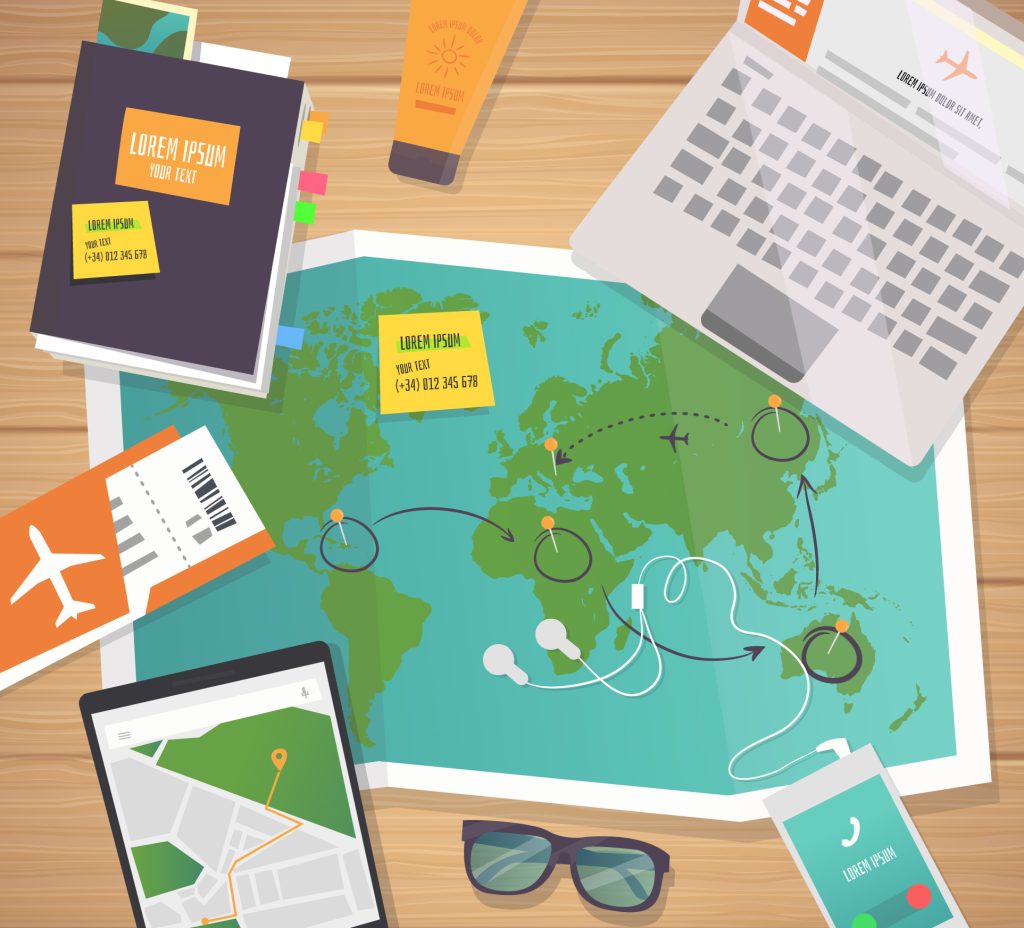In today’s interconnected world, the concept of traditional work is rapidly evolving. People are embracing new working methods that offer flexibility, freedom, and the opportunity to explore the world while earning a living. One such lifestyle gaining popularity is that of a digital nomad. In this comprehensive guide, we will explore the world of digital nomads, covering everything from what it means to be a digital nomad to the challenges faced, essential skills required, best destinations, and much more. So, let’s enter this exciting journey!
- What is a Digital Nomad?
- Benefits of Being a Digital Nomad:
- Challenges Faced by Digital Nomads:
- Essential Skills for Digital Nomads:
- How to Transition into a Digital Nomad:
- Best Destinations for Digital Nomads:
- Digital Nomad Packing List:
- Finding Accommodation as a Digital Nomad:
- FAQs about Digital Nomads:
- Conclusion:
What is a Digital Nomad?
Before diving into the details, we have to know what is a digital nomad. A digital nomad is an individual who leverages technology to work remotely and leads a location-independent lifestyle. They are not bound by a traditional office setup and have the freedom to choose their workplace, whether it’s a beachfront cafe, a co-working space, or the comfort of their own home. Digital nomads rely on laptops, smartphones, and an internet connection to perform their work and stay connected with clients or colleagues.
Benefits of Being a Digital Nomad:
The digital nomad lifestyle offers a range of benefits that attract individuals from various professional backgrounds. Let’s explore some of the key advantages of embracing the digital nomad lifestyle:
Flexibility: Digital nomads have the freedom to set their own schedules and work from anywhere in the world. They can decide when and where to work, allowing for a better work-life balance.
Travel Opportunities: One of the most appealing aspects of being a digital nomad is the ability to travel extensively. Digital nomads can explore new destinations, immerse themselves in different cultures, and broaden their horizons while earning a living.
Increased Productivity: Without the constraints of a traditional office environment, digital nomads often experience increased productivity. They can choose the optimal work environment for themselves and eliminate common office distractions.
Cost Savings: Depending on the chosen destination, the digital nomad lifestyle can be more cost-effective than living in a major city. Lower living costs and the ability to optimize expenses contribute to the financial advantages of this lifestyle.
Personal Growth: Being a digital nomad pushes individuals out of their comfort zones, fostering personal growth and development. It encourages adaptability, resilience, and the ability to thrive in new and unfamiliar situations.
Networking Opportunities: The digital nomad community is vibrant and ever-growing. By interacting with fellow digital nomads, individuals can expand their professional networks, collaborate on projects, and gain valuable insights.
These are just a few of the many benefits that come with embracing the digital nomad lifestyle. Now, let’s explore the challenges faced by digital nomads and how to overcome them.
Challenges Faced by Digital Nomads:
While the digital nomad lifestyle offers numerous advantages, it also comes with its fair share of challenges. It’s essential to be aware of these challenges and develop strategies to overcome them. Let’s delve into some common challenges faced by digital nomads:
Isolation and Loneliness: Working remotely can sometimes lead to feelings of isolation and loneliness, especially when traveling alone. Digital nomads may miss the social interactions and sense of community that traditional office environments provide.
Maintaining Work-Life Balance: The flexibility of the digital nomad lifestyle can blur the boundaries between work and personal life. It’s crucial to establish a healthy work-life balance to prevent burnout and maintain overall well-being.
Unpredictable Income: Digital nomads often rely on freelance work or remote job opportunities, which can result in irregular income streams. Managing finances and ensuring a stable income can be a significant challenge.
Finding Reliable Internet Access: As a digital nomad, a stable internet connection is vital for work. However, not all destinations offer reliable internet access, which can hinder productivity and communication.
Time Zone Differences: Collaborating with clients or team members located in different time zones can pose challenges in terms of scheduling meetings, coordinating projects, and maintaining effective communication.
These are just a few examples of the challenges faced by digital nomads. While they may seem daunting, there are strategies and solutions to overcome them. Developing essential skills can help digital nomads thrive in this lifestyle.
Essential Skills for Digital Nomads:
To succeed as a digital nomad, certain skills are crucial to master. Let’s explore some essential skills that can significantly impact the digital nomad lifestyle:
Self-Discipline: With the freedom to set their own schedules, digital nomads must possess the self-discipline to manage their time effectively and stay motivated. Setting goals, creating routines, and establishing a work schedule is key to maintaining productivity.
Adaptability: Digital nomads frequently encounter new environments, cultures, and challenges. The ability to adapt to changing circumstances, navigate unfamiliar situations, and embrace different cultures is essential.
Communication Skills: As a digital nomad, effective communication becomes even more critical. Clear and concise communication, both written and verbal, helps in collaborating with clients, colleagues, and fellow digital nomads.
Problem-Solving: Digital nomads often face unexpected situations and challenges. Strong problem-solving skills enable them to think creatively, find solutions, and overcome obstacles.
Time Management: Managing time efficiently is crucial when balancing work and travel. Digital nomads must prioritize tasks, set realistic deadlines, and avoid procrastination to ensure productivity.
Technical Proficiency: Since digital nomads rely heavily on technology, having a strong understanding of digital tools, software, and online platforms is essential. This includes proficiency in using productivity tools, project management software, and online communication platforms.
By developing and honing these skills, digital nomads can thrive in their chosen lifestyles. Now, let’s explore how to transition into a digital nomad and embark on this exciting journey.
How to Transition into a Digital Nomad:
Transitioning into the digital nomad lifestyle requires careful planning and preparation. Here are some steps to consider when making the switch:
Assess Your Skills and Work Options: Evaluate your current skills and identify remote job opportunities or freelance work that aligns with your expertise. Determine how you can leverage your skills in a remote work environment.
Financial Planning: Before transitioning, assess your financial situation and develop a budget. Consider factors such as travel expenses, accommodation costs, and potential fluctuations in income. It’s essential to have the financial stability to sustain the digital nomad lifestyle.
Build a Remote Work Portfolio: If you’re considering freelancing or remote work, create a portfolio that showcases your skills and past projects. Highlight your achievements and demonstrate your ability to work independently.
Research and Choose Destinations: Research different destinations that are digital nomad-friendly. Consider factors such as cost of living, safety, quality of life, and internet connectivity. Make a list of potential destinations that suit your preferences and requirements.
Prepare Travel Logistics: Arrange necessary travel logistics such as visas, travel insurance, and accommodation. Determine how long you plan to stay in each destination and create a rough itinerary.
Network and Connect with Other Digital Nomads: Join digital nomad communities and connect with fellow nomads. Attend meetups, join online forums, and participate in events to expand your network and gain valuable insights.
Transitioning into a digital nomad lifestyle requires careful planning, adaptability, and a willingness to embrace change. By taking these steps, you can embark on an exciting journey of remote work and travel. Now, let’s explore some of the best destinations for digital nomads.
Best Destinations for Digital Nomads:
As a digital nomad, the world becomes your office. While there are countless destinations to choose from, certain places have gained popularity among digital nomads for their infrastructure, affordability, and vibrant communities. Let’s explore some of the best destinations for digital nomads:
Bali, Indonesia: Known for its stunning landscapes, affordable living costs, and thriving digital nomad community, Bali offers a unique blend of work and relaxation. The island’s laid-back lifestyle and co-working spaces make it an attractive destination.
Chiang Mai, Thailand: Chiang Mai is renowned for its low cost of living, welcoming locals, and excellent infrastructure. The city has a vast array of co-working spaces, cafes, and digital nomad meetups, making it a popular choice for remote workers.
Lisbon, Portugal: With its charming atmosphere, beautiful architecture, and favourable climate, Lisbon has become a hot spot for digital nomads. The city offers a vibrant startup scene, numerous co-working spaces, and a thriving expat community.
Medellin, Colombia: Medellin has emerged as a digital nomad hub, offering affordable living costs, pleasant weather, and a welcoming culture. The city boasts a variety of co-working spaces, networking events, and outdoor activities.
Budapest, Hungary: Known for its stunning architecture, vibrant nightlife, and rich history, Budapest has become a favourite destination for digital nomads. The city offers a mix of affordable living costs, fast internet, and a burgeoning startup scene.
These are just a few examples of the best destinations for digital nomads. Each destination offers its unique blend of opportunities and experiences. Now, let’s move on to the next section and explore the digital nomad packing list.
Digital Nomad Packing List:
When embarking on a digital nomad journey, packing efficiently and effectively is crucial. Here’s a comprehensive packing list to ensure you have everything you need for a successful digital nomad lifestyle:
Laptop: Choose a reliable and lightweight laptop that suits your work requirements.
Universal Adapter: Carry a universal adapter to charge your devices in different countries.
Portable Wi-Fi Router: Ensure a stable internet connection by having a portable Wi-Fi router.
Smartphone: Keep a smartphone for communication, accessing essential apps, and staying connected.
Noise-Cancelling Headphones: Block out distractions and create a focused work environment with noise-cancelling headphones.
Travel Backpack: Invest in a comfortable and durable travel backpack to carry your essentials.
Notebook and Pens: Stay organized and jot down important notes with a notebook and pens.
Travel Insurance: Protect yourself against unforeseen circumstances with travel insurance.
Document Organizer: Keep your important documents, such as passports and visas, organized and secure.
Clothing for Various Climates: Pack a mix of clothing suitable for different climates, seasons, and cultural expectations.
Toiletries and Personal Care Items: Carry essential toiletries, medications, and personal care items.
Travel-Sized Laundry Kit: Stay fresh on the go with a travel-sized laundry kit.
First Aid Kit: Be prepared for minor injuries and ailments with a compact first aid kit.
Reusable Water Bottle: Stay hydrated and reduce plastic waste with a reusable water bottle.
Travel-Friendly Work Equipment: Consider additional work equipment, such as a wireless mouse, external hard drive, or ergonomic keyboard.
Remember to tailor the packing list to your specific needs and destination. Now that we’ve covered the packing essentials, let’s explore how to find accommodation as a digital nomad.

Finding Accommodation as a Digital Nomad:
As a digital nomad, finding suitable accommodation plays a crucial role in your overall experience. Consider the following tips when searching for accommodation:
Research Different Options: Explore a range of accommodation options, including apartments, guesthouses, co-living spaces, or house-sitting opportunities. Research reputable platforms such as Airbnb, Booking.com, or dedicated digital nomad accommodation websites.
Location Considerations: Look for accommodation in areas that offer a conducive work environment, access to amenities, and a vibrant digital nomad community. Consider factors like safety, proximity to co-working spaces or cafes, and access to public transportation.
Read Reviews: Before booking accommodation, read reviews from previous guests to get an idea of the overall experience. Pay attention to reviews that mention reliable Wi-Fi, a quiet working environment, and helpful hosts.
Co-living Spaces and Co-working Retreats: Consider joining co-living spaces or co-working retreats tailored for digital nomads. These spaces often provide a built-in community, networking opportunities, and a work-friendly environment.
Negotiate Long-Term Stays: If you plan to stay in a particular destination for an extended period, negotiate long-term rental agreements. This can often result in more favourable rates and terms.
Consider House-Sitting: House-sitting platforms connect digital nomads with homeowners who need someone to take care of their property while they’re away. House-sitting can provide cost-effective accommodation options in exchange for looking after the property.
By being thorough in your research and considering your specific needs and preferences, you can find accommodation that suits your digital nomad lifestyle. Now, let’s move on to the next section and answer some frequently asked questions about digital nomads.
FAQs about Digital Nomads:
Q1: How do digital nomads make money?
A1: Digital nomads make money through various avenues, such as remote employment, freelancing, entrepreneurship, or running online businesses. They offer services or expertise in areas such as writing, graphic design, programming, marketing, consulting, and more.
Q2: Is it necessary to have savings before becoming a digital nomad?
A2: Having savings before becoming a digital nomad is highly recommended. It provides a financial cushion during the initial transition period and helps cover expenses while establishing a stable income stream.
Q3: Do digital nomads pay taxes?
A3: Tax obligations for digital nomads vary depending on their country of residence, citizenship, and the duration spent in each location. It’s essential to consult with tax professionals or accountants to understand the tax requirements and implications.
Q4: How do digital nomads handle healthcare and insurance?
A4: Digital nomads often rely on travel insurance that covers medical expenses and emergencies. Some opt for international health insurance plans that provide comprehensive coverage. It’s crucial to research and choose a suitable insurance option based on individual needs.
Q5: How do digital nomads manage work-life balance?
A5: Achieving work-life balance as a digital nomad requires setting boundaries, establishing routines, and prioritizing self-care. It’s essential to allocate dedicated time for work, leisure, and personal activities to maintain a healthy balance.
Q6: Can families or couples become digital nomads?
A6: Absolutely! Digital nomadism is not limited to individuals. Families and couples can embrace this lifestyle by considering factors such as schooling options, accommodation suitable for multiple people, and finding a balance between work and family time.
Q7: Are there communities or networks for digital nomads?
A7: Yes, digital nomad communities and networks exist worldwide. Online forums, social media groups, co-working spaces, and organized events offer opportunities to connect with fellow digital nomads, share experiences, and seek support.
Q8: Is it possible to have a stable career as a digital nomad?
A8: Yes, it is possible to have a stable career as a digital nomad. With careful planning, building a strong professional network, and consistently delivering high-quality work, digital nomads can establish a sustainable career path.
Q9: How do digital nomads handle visa requirements?
A9: Visa requirements vary depending on the destination and the individual’s nationality. Some countries offer specific visas or programs for digital nomads, while others require standard tourist visas or working visas. It’s important to research and understand the visa regulations of each country visited.
Q10: Can digital nomads travel with pets?
A10: Traveling with pets as a digital nomad is possible, but it requires additional planning and preparation. Each country has different regulations regarding pet entry, vaccination requirements, and quarantine periods. It’s essential to research and comply with the specific pet travel regulations of each destination.
Conclusion:
The digital nomad lifestyle offers a unique opportunity to blend work and travel, providing freedom, flexibility, and new experiences. By embracing the digital nomad lifestyle, individuals can enjoy a location-independent career, explore diverse cultures, and foster personal growth. While the journey comes with challenges, such as isolation, maintaining a work-life balance, and unpredictable income, proper planning, adaptability, and a proactive approach can help overcome these obstacles. Remember to assess your skills, plan your finances, choose suitable destinations, and build a supportive network of fellow nomads. Prioritize self-care, maintain a productive work routine, and seize opportunities for growth and learning.



